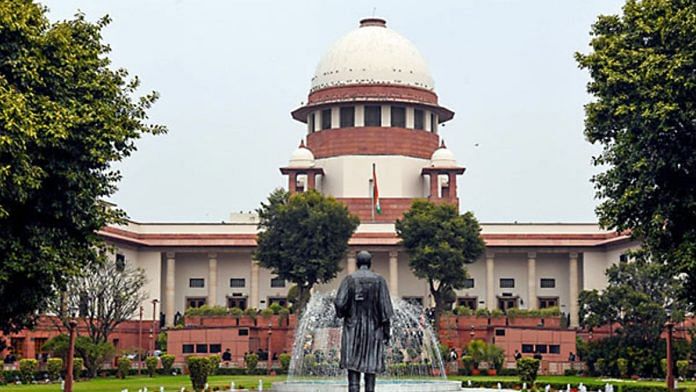New Delhi: The Supreme Court indicated Friday it might grant interim bail to Delhi Chief Minister Arvind Kejriwal to let him participate in the ongoing Lok Sabha elections.
A bench of Justices Sanjiv Khanna and Dipankar Datta made this proposition when it was hearing Kejriwal’s appeal questioning his arrest and subsequent remand to the Enforcement Directorate (ED).
Kejriwal is in jail for his alleged involvement in the Delhi excise ‘scam’. To be sure, Kejriwal has not asked for bail, but has challenged his arrest on technical grounds. He has been arrested by the ED, which is probing the money-laundering aspect of the case, with the Central Bureau of Investigation (CBI) looking into the aspect of alleged corruption.
The bench’s remarks came while ED counsel Additional Solicitor General S.V. Raju was addressing the court in response to Kejriwal’s arguments against the arrest.
Justice Khanna, who heads the bench, told the law officer that if the hearing took a long time, then the court would consider the question of interim bail to Kejriwal, but only for the purposes of elections.
The bench also enquired from the counsel about the date of election in Delhi.
“This case may take time. But if the case takes time, we may consider the question of interim bail, because of the elections. Let’s be very clear on that … Please be considerate, both sides,” the court orally remarked, as it fixed 7 March to hear the matter further.
Voting for all 7 seats in Delhi will take place on 25 May.
The judges clarified if at all they decide to release him on bail, it will be only in the form of an interim relief.
“It (interim bail) may be considered if the hearing is unlikely to conclude soon,” Justice Khanna emphasised. “Please also take instructions — we are not saying anything (on whether bail will be granted or not) — we would like to consider grant of interim bail because of elections.”
Raju urged the bench to hear the ED before even deciding on the factum (facts of the case) of interim bail, which the bench said it would.
To Kejriwal’s lawyer, senior advocate Abhishek Manu Singhvi, the bench said: “…don’t start without even hearing us — we may or may not grant. We are going to hear you. We must be open to you, because neither side should be taken by surprise.”
It also said the court will ponder into the question of whether in the event of his release, should Kejriwal be allowed to sign any official file.
“We are being open, do not assume anything … Do not read anything into it. We are not saying either way,” Justice Khanna said.
On Friday, Singhvi wrapped up his arguments on behalf of Kejriwal. He said even if the “AAP is accused of some wrongdoing by the ED by citing Section 70 (offences by companies) of the Prevention of Money Laundering Act (PMLA), Kejriwal could not have been arrested.”
But the court appeared to differ and remarked if the “AAP is viewed as a juristic person or a company and made an accused, the principle of vicarious liability would apply.”
“This would mean Kejriwal could be assigned liability as the person being at the fore of the political party,” it said.
To this Singhvi contended Section 70 of the PMLA was never intended to cover a political party as it deals with companies.
Raju submitted that Kejriwal’s counsel is only making general statements, instead of addressing how the AAP leader cannot be incriminated.
On being asked whether the ED is bound to disclose “the entire material” collected during investigation or only a part of such material, Raju replied “it would not be practical to expect a probe agency to record all material collected during a probe, as it may run to thousands of pages and bog down the ED officers.”
The law officer said the arresting officer can arrest the accused based on incriminating material in his possession. If there is some material to incriminate an accused, the arresting officer can make an arrest, he said.
(Edited by Tony Rai)
Also Read: Why was Arvind Kejriwal arrested ahead of Lok Sabha polls, Supreme Court asks ED




7 March?